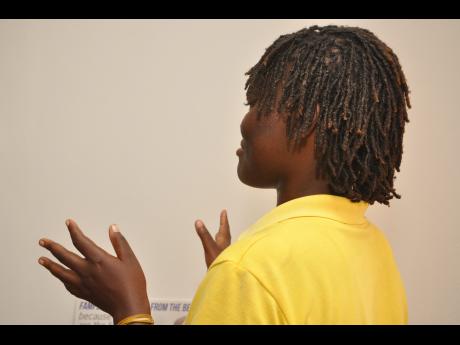Still suffering in silence - Women refusing to report incidents of domestic violence despite calls to speak up
One in every five Jamaican women who experience physical or sexual abuse from their intimate partners stays silent about the incident, despite efforts to get them to speak up and the international example being set by groups such as the #MeToo movement.
That is one of the findings of a recently released 2016 study conducted by social researcher Carol Watson Williams and co-published by the Statistical Institute of Jamaica, the Inter-American Development Bank (IDB) and the United Nations Entity for Gender Equality and the Empowerment of Women.
The researcher canvassed 1,340 females between ages 15 and 64 and found that just over 18 per cent of the abused women told no one about the violence, while the majority of those who decided to speak up confided in friends.
Fewer than 20 per cent of the women reported the abuse to the police.
“More than one-third of women confided in their mother (35.1 per cent), 27.8 per cent told siblings and 19.1 per cent confided in neighbours,” said the study, which also found that many of the abused women believe that violence between husbands and wives is a private matter.
“Women who had entered into a live-in partner relationship at an early age (under 19 years) had a higher prevalence of lifetime intimate partner physical violence (45 per cent) compared with 24.5 per cent for those who had entered into such relationships at age 19 or older,” the study revealed.
Last week, Pastor Carla Dunbar of the Praise Sanctuary Church of God of Prophecy agreed that young women who enter into early relationship are more likely to be abused by their partners.
But Dunbar said more women are confiding in religious leaders to help them bear their crosses.
“I don’t think, though, that persons who come to me do so because of my academic qualification. I think they do so because I am a pastor who opened up her story and was vulnerable on a national level to share her own experiences,” said Dunbar, who had been in an abusive relationship for years.
According to Dunbar, there are several reasons why women opt to stay silent about their abuse but financial obligations tend to be the main one.
“In our Jamaican context, it is the whole financial aid. This abusive person is still the one paying the rent and providing the food and the sense of security. Fear is also another factor why persons don’t say anything,” said Dunbar.
One of the abused women, Shelly-Ann* of Maverley in St Andrew, told The Sunday Gleaner that she has been living with an abusive partner for 15 years and she does not know when she will muster the courage to tell friends or family about it.
“It started out with something minor, like him holding and jerking me, but then it got to be more than that, more physical, like punches. Then days later he would come with the ‘I’m sorry’, and he would do the most like buy stuff, be really nice and do everything,” said Shelly-Ann.
She said she has stayed silent because her mother doesn’t like her partner and she does not want to prove her mother’s suspicions correct.
According to Shelly-Ann, she also cannot face the criticisms which would come from friends who would be upset that she has stayed in the abusive relationship for so long.
* Name changed on request
SOME HELPLINES FOR ABUSED WOMEN
WOMEN’S CRISIS CENTRE – 876-929-2997/876-926-9398
CHILD ABUSE and TRAFFICKING – TOLL FREE 1 (888) 776-8328 (PROTECT)
THE HELPLINES (for parents & children) – TOLL FREE 1 (888) 429-5273 (KARE) 9AM – 4 p.m.
POLICE – TOLL FREE 119
CISOCA (Police unit for child abuse and sex crimes with some level witness protection) – 876- 926-407

